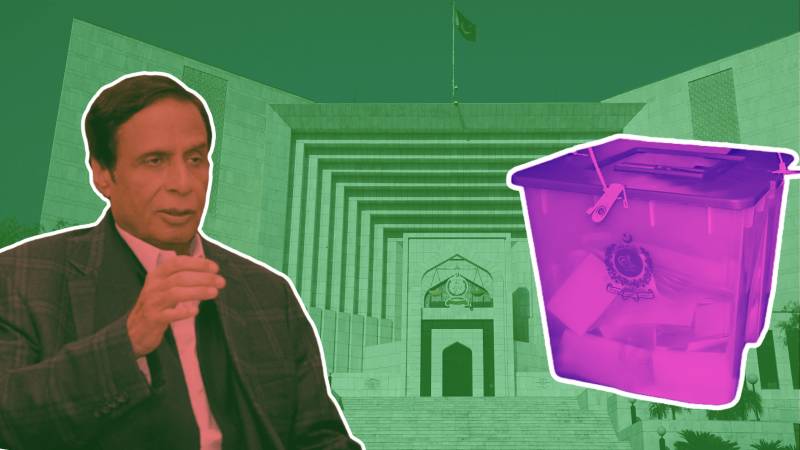
Former Punjab chief minister and Pakistan Tehreek-e-Insaf (PTI) President Chaudhry Parvez Elahi approached the Supreme Court on Wednesday, urging it to allow him to contest the February 8 general elections.
Elahi, who is currently an under-trial prisoner in the Adiala jail, filed an appeal in the Supreme Court challenging a decision of the Lahore High Court (LHC) to uphold the rejection of his nomination papers.
The relevant returning officer had rejected Elahi's nomination papers because he had failed to provide a bank account exclusive to the constituency he was contesting, and he had listed the same account for use in another constituency.
Amjid Mehmood, a candidate for PP-34 Gujrat-VIII, had raised objections over Elahi's nomination papers. While accepting the objections, the RO rejected Elahi's nomination papers on December 30.
Elahi challenged the returning officer's decision before an election tribunal. But on January 10, the tribunal upheld the decision to reject his papers. The tribunal's decision was challenged in the LHC, which also upheld the returning officer's decision.
Through Barrister Haris Azmat, Elahi filed an appeal in the Supreme Court, nominating the Election Commission of Pakistan (ECP), Election Appellate Tribunal for PP-34 Gujrat-VIII, Returning Officer (RO) and Amjid Mehmood as respondents.
Elahi contended that the appellate forums had failed to consider that there has been a marked shift in provisions for submitting bank accounts under the Elections (Second Amendment) Act, 2023, wherein a candidate is now allowed to submit an existing bank account.
"This misapplication of the law is alone sufficient to set aside the impugned judgment and accept the nomination papers of the petitioner," the appeal requested.
It further contended that the RO never called Elahi to rectify any omission to ensure the nomination paper adhered to the law.
"In any event, the provision of the bank account is at a stage which is much later in time and could easily have been cured by easily providing another bank account to the RO. This omission was not fatal, and at best, was a curable defect," Elahi argued.
He maintained that it is an admitted position that the account cited in his papers was dedicated to election expenses, which only comes into play after the acceptance of the nomination papers – at the time of elections.
"Hence, a liberal view should have been taken by the forums below."
Elahi further contended that he had attempted to open new bank accounts despite no such requirement under the law. His attempt, however, failed when the bank informed him that his name is on some ''prescribed list'' which does not allow him to open a bank account.
"In view of this matter alone, the omission, if at all, cannot be attributed to the Petitioner, who must be given the benefit in such circumstances."
Another reason for rejecting Elahi's nomination papers was that he had allegedly concealed his share in Lahore Modern Flour Mills (Private) Limited.
The appeal stated that the courts were specifically informed that the flour mill had been incorporated in 2008, but it has remained non-functional since. So much so, Elahi argued, that a national tax number has not been issued in its name.
"Moreover, no bank account of the flour mill was opened. Hence, none of the shares was ever paid up. Pertinently, no amount from the petitioner was ever deposited in the defunct flour mill for purchase of shares, which makes it clear that the same is not an asset, and the non-disclosure of the same does not entail any penal consequences," he said, adding that the mill is a dormant entity.
"The shares that have been attributed to the petitioner are 2,485, worth Rs10 each, which makes it a total of shares worth Rs24,850, which in any event was also never subscribed nor paid."
In contrast, Elahi said he had declared assets worth more than Rs175 million, in which the cash in hand was more than Rs57 million.
"The petitioner has no benefit in the concealment of such a minor asset, nor would gain any advantage from the same," he argued. "Although this is not even a non-disclosure, but even as per the settled law of the Supreme Court, this non-disclosure is not fatal and should not have disenfranchised the petitioner."
Regarding the concealment of his ownership of seven weapons, Elahi argued that no column in the nomination papers or provision of law specifically required the disclosure of licenced weapons as assets.
"It is well settled by now that to take part in the election process is a fundamental right; therefore, to disenfranchise the petitioner, depriving of him a valuable right of franchise guaranteed under the Constitution is to be strictly construed," he argued, adding that in his case, this valuable fundamental right had been done away with by virtue of the high court's judgment in a slipshod and cursory manner without proper appreciation of the law.
"The petitioner will suffer irreparable loss and injury if the impugned judgment is not set aside," he prayed, urging the court to allow him to contest the elections.

